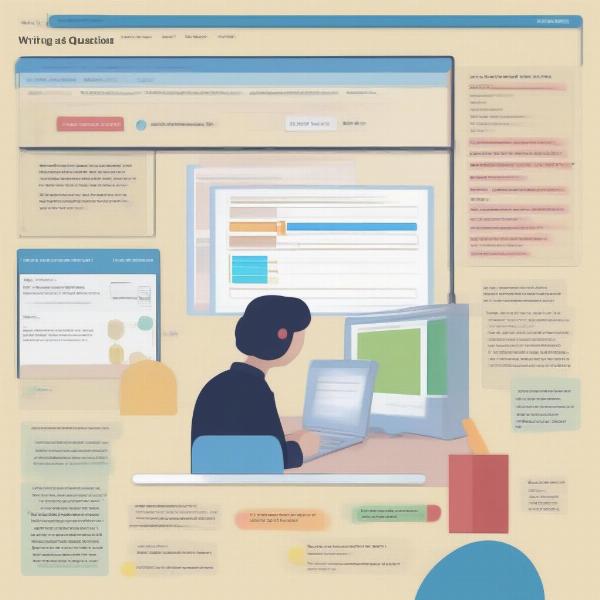Trivia games offer a fantastic way to test knowledge, spark friendly competition, and bring people together. Whether it’s a casual pub quiz, a competitive tournament, or a themed game night at home, setting up a trivia game can be a rewarding experience. This guide provides a comprehensive walkthrough on How To Set Up A Trivia Game, covering everything from choosing a theme and crafting questions to scoring and prizes.
Similar to creating a new board game, crafting a captivating trivia game requires planning and execution. This guide will equip you with the tools and knowledge you need to create a memorable trivia experience for any occasion.
Choosing a Theme and Format
Before diving into question writing, decide on a theme. A focused theme makes question creation easier and more engaging for participants. Consider popular themes like movies, music, history, sports, or pop culture. You can even tailor the theme to a specific interest group, like video game lore or 80s nostalgia. The format of your trivia game can vary. Will it be a traditional question-and-answer format, a multiple-choice quiz, or something more interactive like a picture round or audio clues?
 Choosing the Right Theme for Your Trivia Night
Choosing the Right Theme for Your Trivia Night
Once you have a theme and format, consider the difficulty level. Are you designing a challenging quiz for seasoned trivia buffs, or a more lighthearted game for casual players? Adjusting the difficulty ensures everyone has a chance to participate and enjoy the experience. Think about whether you’ll be incorporating visual aids, audio clips, or bonus rounds to add variety and excitement to the game.
Crafting Engaging Trivia Questions
Writing good trivia questions is an art. Aim for clear, concise, and unambiguous questions. Avoid trick questions or those with multiple possible answers. Fact-check meticulously to ensure accuracy. A good mix of easy, medium, and hard questions keeps all players engaged. Don’t forget to consider the knowledge base of your target audience. For example, questions appropriate for a group of history professors would likely be too challenging for a general audience.
 Crafting Engaging and Challenging Trivia Questions
Crafting Engaging and Challenging Trivia Questions
Variety is key to keeping things interesting. Mix and match question types, including true/false, multiple-choice, fill-in-the-blank, and open-ended questions. You can even incorporate visual or audio elements, like identifying a song clip or naming a historical figure from a photograph. Adding such variations can cater to different learning styles and keep participants on their toes. Also, consider incorporating some questions related to how many ending in a baseball game, as this can introduce a unique and challenging element for sports enthusiasts.
Setting Up the Game Environment
Choose a suitable location for your trivia game. This could be a pub, a community hall, a classroom, or even your living room. Ensure adequate seating, good lighting, and a clear space for displaying questions and answers. If using technology, test your equipment beforehand to avoid technical glitches during the game. Prepare scorecards or a digital scoring system. Decide on a method for teams or individuals to submit their answers. Will they write them down, use buzzers, or submit electronically? Having a clear process for answering and scoring ensures a smooth and fair game.
Scoring and Prizes
Decide on a scoring system. Will points be awarded for each correct answer, or will there be bonus points for specific rounds? Consider offering prizes for the winners. Prizes can range from simple bragging rights to gift certificates, trophies, or themed gifts related to your trivia topic. Offering prizes adds an element of excitement and encourages friendly competition. Announcing the winners and celebrating their achievements is a great way to conclude the event on a high note.
 Scoring and Prizes for a Thrilling Trivia Night
Scoring and Prizes for a Thrilling Trivia Night
Different Platforms for Hosting Trivia Games
There are a multitude of platforms available for hosting trivia games, each with their own unique advantages and disadvantages. From online platforms specifically designed for trivia, to general video conferencing software, choosing the right platform depends on the size and location of your audience. Understanding the pros and cons of each can help you make an informed decision and ensure a seamless trivia experience.
Creating a Balanced and Engaging Trivia Experience
A successful trivia night involves more than just well-written questions. It’s about creating a balanced and engaging experience for all participants, regardless of their trivia expertise. This means considering factors such as the difficulty of questions, the pacing of the game, and the overall atmosphere of the event. A well-paced game keeps participants engaged without feeling rushed, while a positive and encouraging atmosphere fosters friendly competition and ensures everyone has fun.
Conclusion
Setting up a trivia game is a fun and rewarding experience. By following these guidelines, you can create a memorable and engaging event for everyone involved. Remember to carefully consider your audience, choose a theme that resonates, and craft challenging yet fair questions. A well-planned trivia game is a guaranteed way to entertain, educate, and create lasting memories. So, gather your friends, family, or colleagues and embark on a trivia adventure! Are you smarter than a fifth grader dvd game? Find out by organizing your own trivia night!
FAQ
- How many questions should I prepare for a trivia game? Aim for around 20-30 questions per hour of gameplay.
- What are some good resources for finding trivia questions? Books, websites, and even other trivia games can be excellent sources of inspiration.
- How can I prevent cheating during a virtual trivia game? Implement strategies like screen sharing monitoring and timed rounds to minimize cheating opportunities.
- What are some alternative scoring methods besides points per correct answer? Consider awarding bonus points for speed, creativity, or teamwork.
- How do I choose appropriate prizes for my trivia game? Tailor the prizes to the interests of your audience and the theme of your game.
- What are some good icebreaker activities to start a trivia night? Start with a few easy questions or a fun, themed icebreaker game to get everyone relaxed and engaged.
- How can I make my trivia game more accessible to players with disabilities? Consider providing alternative formats for questions and answers, such as audio or large print.

